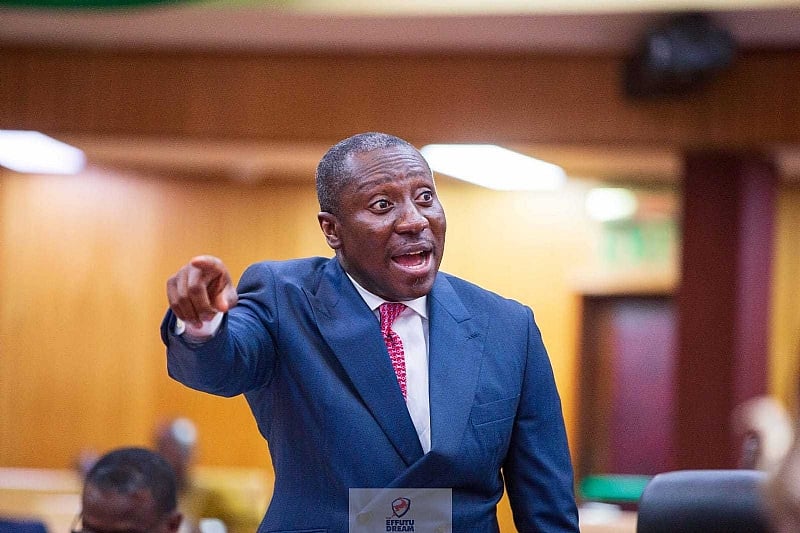The recent vetting of ministerial nominees in Ghana’s Parliament has sparked a heated exchange between the Majority and Minority members of the Appointments Committee, with accusations of intimidation and procedural breaches flying from both sides. Minority Leader Alexander Afenyo-Markin has publicly criticized the National Democratic Congress (NDC) members of the committee, alleging they engaged in intimidation tactics during the Thursday evening session. He defended the Minority’s rigorous questioning of the nominees, emphasizing their commitment to thoroughly scrutinizing candidates, even though they often refrain from questioning some nominees. Afenyo-Markin asserted that the Minority’s duty is to ask pertinent questions where necessary, and they will not be deterred from fulfilling this responsibility. He countered accusations of obstructionism by highlighting the Majority’s alleged attempts to intimidate the Minority, claiming the NDC has a history of bullying tactics and using their numerical advantage to suppress dissenting voices.
The core of the dispute revolves around the number of nominees to be vetted and the process by which the schedule was determined. Afenyo-Markin stated that an initial agreement had been reached between the Majority and Minority to vet three nominees. However, he alleges that the NDC subsequently attempted to add more nominees to the schedule without proper consultation or consensus. He pointed to a perceived partisan bias within the committee, suggesting that certain individuals aligned with the NDC were instrumental in these unilateral changes. Afenyo-Markin expressed concern over the lack of transparency and collaboration in setting the vetting agenda, emphasizing the established practice of the chairman and ranking member jointly agreeing on the schedule. He criticized the alleged unilateral decision by the Majority to alter the agreed-upon plan, claiming that the Clerk advertised a different schedule late at night without prior consultation.
Afenyo-Markin further elaborated on the sequence of events, detailing how the Minority’s initial agreement to vet three nominees was followed by escalating demands from the Majority to increase the number. He claimed the Majority initially proposed vetting four nominees, then later attempted to “compromise” by adding one more, ultimately settling on five. This perceived shifting of goalposts, according to Afenyo-Markin, created an environment of distrust and undermined the collaborative spirit essential for the smooth functioning of the Appointments Committee. He suggested that the Majority’s strategy was to overwhelm the Minority with a larger number of nominees, hoping to force a boycott. However, he firmly stated that the Minority would not succumb to such tactics and would continue to participate in the vetting process.
The accusations and counter-accusations between the Majority and Minority underscore the inherent tensions within the parliamentary vetting process. The Minority’s insistence on thorough scrutiny, juxtaposed with the Majority’s desire for expeditious appointments, creates a potential for conflict. The dispute over the vetting schedule further highlights the importance of clear communication and established procedures to ensure transparency and fairness. The allegations of intimidation and unilateral decision-making raise concerns about the overall integrity of the process, potentially undermining public trust in the impartiality of the Appointments Committee.
Beyond the immediate disagreements regarding the specific vetting session, the ongoing tensions reflect broader political dynamics within Ghana’s parliament. The characterization of the NDC as employing bullying tactics and the Majority’s alleged attempts to circumvent established procedures suggest a deeper struggle for control and influence. The Minority’s emphasis on their role as a check on executive power, even in the face of numerical disadvantage, underscores the importance of robust oversight in a democratic system. The effectiveness and credibility of the vetting process depend on the ability of both sides to engage in constructive dialogue and adhere to established protocols.
The accusations and counter-accusations also raise questions about the potential impact on the governance of Ghana. Delays and disruptions in the vetting process can hinder the timely appointment of key government officials, potentially affecting the delivery of essential services and the implementation of government policies. Furthermore, the public airing of grievances and accusations of impropriety can erode public confidence in the political process and contribute to a perception of dysfunction within the government. It is crucial for both the Majority and Minority to prioritize the national interest and work towards a more collaborative and transparent approach to the vetting process, ensuring the smooth functioning of government and upholding the principles of democratic governance.


